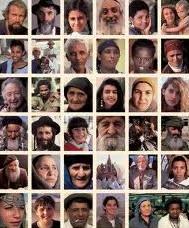One people including me...
As a visible minority, my black skin marks me out in a sea of white, as having some tale to tell. And so, if it’s not a million intrusive and intimate questions to justify my presence, it's the cold shoulder.
I’ve gone into shuls where not a single person said hello to me. I’ve squirmed through sermons on the evils of intermarriage and its accompanying ugly twin, assimilation. I’ve had people ask questions in front of me about why Jews should bother engaging with other communities if it only leads to oblivion. Through all these and worse, I have endured red-hot embarrassment. From countless number of humiliations and indignities I have persevered, and in their discomfort and bigotry, I prevail.
I am lucky to be part of a warm, friendly and affirming Orthodox community in London (in case you were wondering). But when I venture outside my comfort zone, into the mono-cultural, white, Jewish community of the UK, I have to take several deep breaths and psyche myself up, sure in the expectation that I will be made to feel unwelcome.
It is at these times that I find myself seriously questioning my choices. For what am I flagellating myself? How much humiliation can I bear, why do I allow myself to stand for this? For it doesn’t matter that the very fact that I’m in a synagogue speaks volumes; that is irrelevant to such eyes. The fact is I am the temptress, the snake that coerced your son or daughter to take a bite from the forbidden fruit of the goyim. This, evident in almost every new pair of Jewish eyes that meet mine - the accusatory glares, the studied indifference, the inability to look beyond their own easy prejudice to see the person beneath.
It is most discomforting to know that your very presence makes people uneasy. You can almost see the cogs turning in their heads, as they try and fail to set their features into something benign; except their eyes betray them and their handshake fails them, and their conscience, conflicted, berates them.
I do not ask for your endorsement or your applause for my decision to bind myself to the Jewish people. I chose this path: Unlike you, it didn’t choose me. I am not finishing off Hitler’s work: My life choices, my chosen religion and my relationship, thumb two fingers at that phoney paradigm. I am life-affirming, and testament that cosmopolitan living can enrich traditions, bolster communities and enliven gene pools.
I am the reason why you needn’t be afraid when your son or daughter starts university, or goes out into the wider world; because I am testimony to the fact that ‘loving out’ does not always lead to assimilation. It is idiocy to say that Jewish identity can be reduced to your choice of partner.
In the battle to make our mark on this earth, we hope that even in death our legacy continues through our children. This is not just a case of carrying on our DNA, but our collective hopes and traditions. We want this, so that our death does not mean our oblivion. We need this, so that by our descendents knowing who we were, they can understand and be proud of who they are.
So we battle to keep our culture alive. This impetus to pass on tradition is even stronger in a mixed relationship. Cultural differences sometimes look starker; with one tradition sometimes running the risk of being subsumed by the other, the luxury of learning by osmosis is not always an option, but if there is a will, the cultural inheritance that results can be enriching.
If a person intermarries, how do we help our community by shunning him? The wilful exclusion of people, which associates Jewish values with feelings of hurt, shame and rejection, is what continues Hitler’s work. If there is will, there should be an attempt to at least extend a hand, however tentative.
I have resigned myself to the fact that because I look different I will always be treated differently, regardless of my Jewish status. And though this saddens me, I refuse to be consumed by bitterness in the face of other people’s prejudices. My hope is, after we have celebrated Shavuot and remembered the story of Ruth, is that we all remember to be kind to the stranger - and especially in sacred spaces, remembering that we too were once strangers in a foreign land.
By Frances Abebreseh

